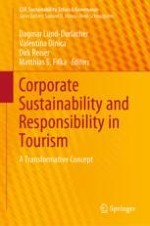2019 | OriginalPaper | Chapter
9. Corporate Responsibility Among International Ecotourism and Adventure Travel Operators
Author : Wolfgang Strasdas
Published in: Corporate Sustainability and Responsibility in Tourism
Publisher: Springer International Publishing
Activate our intelligent search to find suitable subject content or patents.
Select sections of text to find matching patents with Artificial Intelligence. powered by
Select sections of text to find additional relevant content using AI-assisted search. powered by
